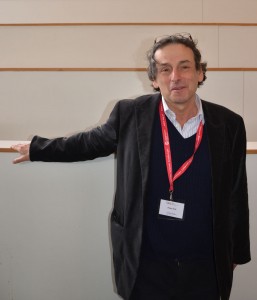Bertalanffy Lecture 2016: “Complex Systems Perspective in Neuroscience – historical and current approaches“ by Prof. Péter Érdi
The Bertalanffy Center for the Study of Systems Science welcomes the renowned expert
Prof. Péter Érdi and invites you to join us for the next event of the BCSSS Lecture Series 2016 in Systems Medicine and Healthcare Systems on Thursday, 22 September 2016, 6 pm
at the Bertalanffy Center for the Study of Systems Science, Paulanergasse 13/5, 1040 Vienna, Austria.
“Complex Systems Perspective in Neuroscience – historical and current approaches“
This lecture is a joint event with the Cognitive Science Research Platform of the University of Vienna (CogSci) and the Austrian Research Institute for Artificial Intelligence (OFAI)
of the Austrian Society for Cybernetic Studies (OSGK).
The talk by Prof. Péter Érdi will present a bird’s eye perspective on Dynamical System’s Theory to the brain, Computational Neurology, Psychiatry and Neuropharmacology
and finally Network-theoretical approach to the brain.
While not always stated explicitly, Systems Neuroscience is interested in understanding
the complexity of the brain.
Prof. Péter Érdi serves as the Henry Luce Professor (LUCE) at the Center for Complex Systems Studies (CCSS) at Kalamazoo College, Michigan, and also keeps his position in Budapest as head of the Theoretical Neuroscience and Complex Systems Group at the
Wigner Research Centre for Physics (WIGNER), one of the research institutes of the Hungarian Academy of Sciences (MTA). Additionally he is the founding Co-Director of
BSCS – Budapest Semester in Cognitive Science study abroad program.
Érdi is a very well known Computational Neuroscientist with a background in Chemical Cybernetics. He started his work in Neuroscience under the supervision of the famous Hungarian Neuroanatomist János Szentágothai. He wrote several books and (co-)published
a variety of scholarly articles in the fields of Chemical Kinetics, Computational Neuroscience
and Complex Systems. In addition he is the Editor-in-Chief of the Elsevier journal Cognitive Systems Research.
In 2012 we already had the pleasure to welcome Prof. Péter Érdi in Vienna during the European Meeting on Cybernetics and Systems Research (EMCSR 2012) with an inspiring keynote on “40 years in Biocybernetics“.
If you are interested to join the lecture, please send a message to felix.tretter@bcsss.org
Systems Medicine and Healthcare Systems at the BCSSS
Systems Science applications in Medicine are known since the 1950s when Ludwig von Bertalanffy was elaborating his general theory of Living Systems. At present, by new technological and formal methods in modern Biology and Medicine this perspective gets new support.
In order to stimulate this development of interdisciplinary discussion between Medicine, Systems Biology, Informatics and Systems Science this lecture series is organized by the BCSSS, chaired by BCSSS Fellow Prof. Dr. Dr. Dr. Felix Tretter and takes place at the Bertalanffy Center for the Study of Systems Science, Paulanergasse 13/5, 1040 Vienna, Austria.
Together with Prof. Tretter the Bertalanffy Center intends to establish a Research Group to investigate these future potentials. These open meetings mark unique opportunities for researchers and students from a variety of disciplines and representatives from industry, and from the private and governmental health care and insurance system to connect with us.
If you are interested to join, please, send a message to felix.tretter@bcsss.org
Please feel free to forward this invitation.
Further information about Systems Medicine at the BCSSS
Maintenance of health and the development of diseases are the result of complex dynamic interactions. Systems Medicine is the application of systems biology approaches to medical research and medical practice. Its objective is to integrate a variety of biological/medical data at all relevant levels of organization using the power of computational and mathematical modelling, from the level of inter- and intracellular molecular networks of the cell to the levels of the interdependence of humans and their environments.
As many side-effects of medications are caused by the linkage of different organ systems such as heart and lung, the immune system, endocrine system and nervous system, a new approach in medicine is necessary. These connections are statistically known as co-morbidity.
The first step towards systems medicine intended a better understanding of functions and dysfunctions of the organism by using computer simulations of cell and tissue processes. The connections can now be interpreted by such models that are based on data from inter- and intracellular molecular networks (cytokines, neurotransmitters, etc.).
At present, also clinical systems medicine is constituted that focusses on the interaction of organismic subsystems. Some protagonists call this the 4P medicine, for personalized (individual genome analysis), predictive, preventive and participative medicine (L. Hood, Institute for Systems Biology, Seattle) to develop innovative therapies and tailored preventive treatments.
The future outlook is a scenario in which the health care system itself might change based on these findings. A complementary research focus of the Bertalanffy Center in Service Systems Design for large scale, multi-stakeholder complex social systems like health care might be the next promising step.
Please also visit our news/blog about Systems Medicine and Health Care Systems at the BCSSS!
Tags In
Subscribe to our Systems Newsletter
Recent News
- Keynote at the invitation of CIRCULAR4.0 “The European Green Deal – Economic Potential for SMEs”
- Keynote address at the invitation of Energie Steiermark “Potentials of the Circular Economy”
- Expert interview with Circular Business Academy (CBA), Slovenia on the innovation potential of the circular economy for SMEs
- UNIDO: Global consultations on circular economy
- Mission Innovation Austria 2021: A platform for all drivers and shapers of innovation and the energy system of the future

